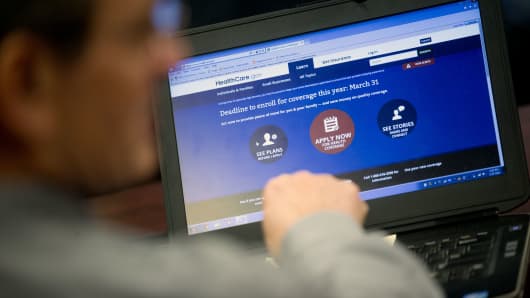There's a world of difference between Americans and the rest of the planet on the question of the government paying for health insurance—but the gap is even bigger within the U.S. between Democrats and Republicans.
 A marketplace guide works on the Healthcare.gov federal enrollment website as he helps a resident sign up for a health insurance plan under the Affordable Care Act at an enrollment event in Milford, Delaware.
A marketplace guide works on the Healthcare.gov federal enrollment website as he helps a resident sign up for a health insurance plan under the Affordable Care Act at an enrollment event in Milford, Delaware.Americans, to a striking degree, are less inclined than citizens of other countries to say that the "government" should be responsible for providing health-care coverage, according to data compiled for CNBC and Burson-Marsteller by market research firm Penn Schoen Berland.
When asked, just 37 percent of people in the United States said that's the government's job.
While that was the top single answer, a total of 50 percent said that insurance is either the responsibility of "individuals" or of "corporations."
In contrast, an average of 65 percent of people in other developed countries said health insurance should be provided by their governments.
And an even stronger majority gave that answer in countries with emerging economies—an average of 72 percent.
The disparity in the results didn't surprise health-care experts, who said that they underscore both cultural differences and the difference between the health-coverage system of the U.S. and most of the rest of the world.
"I think it reflects the fact that they have a national health-care system," said Kaiser Family Foundation president Drew Altman, referring to the other countries whose residents overwhelmingly believe it's the responsibility of governments to provide their coverage. In contrast, the U.S. does not have a national health-care system.
